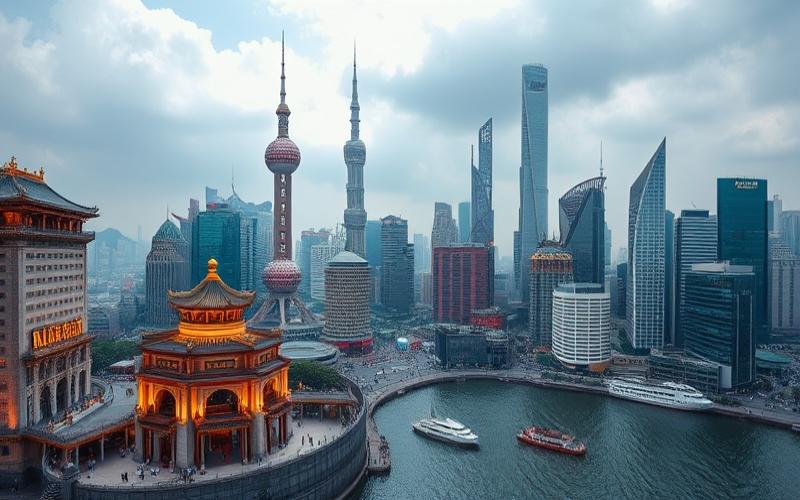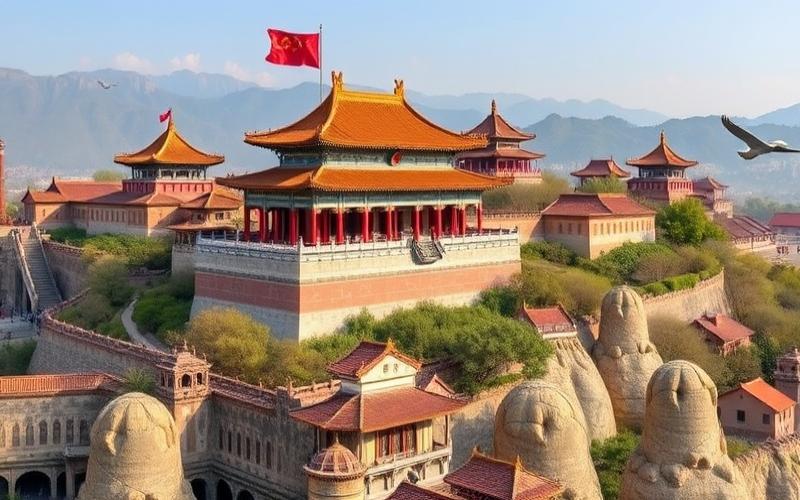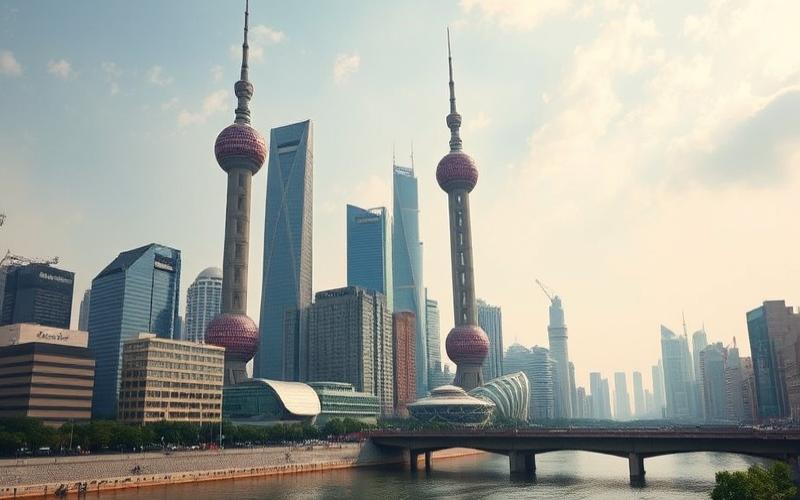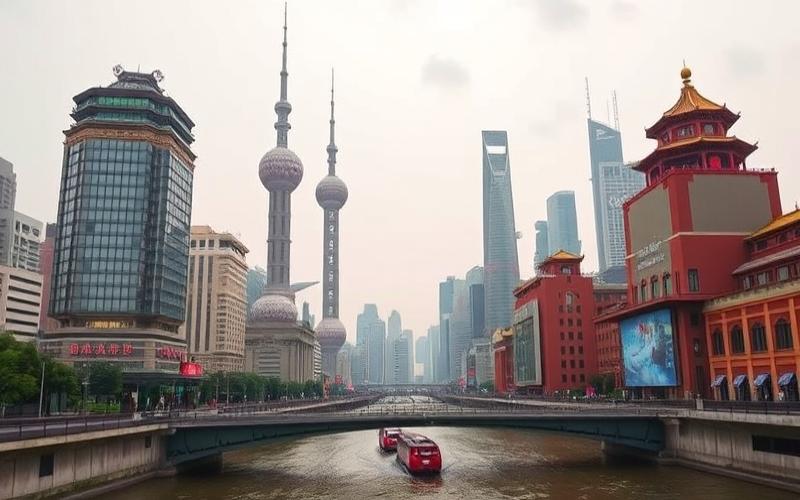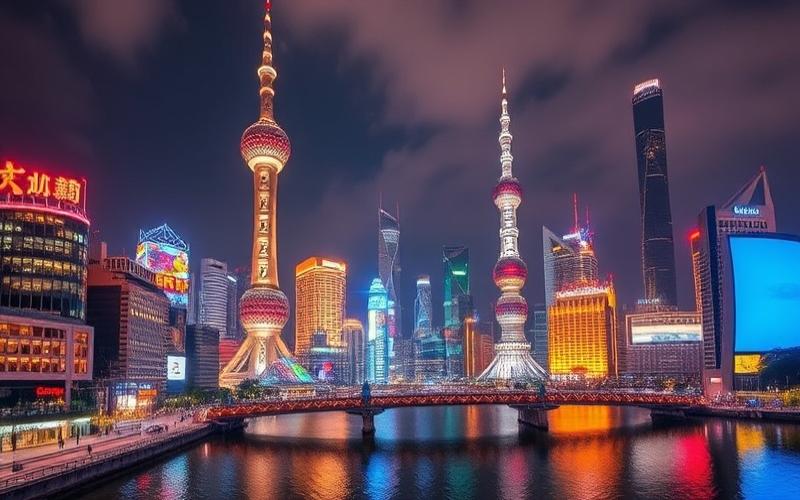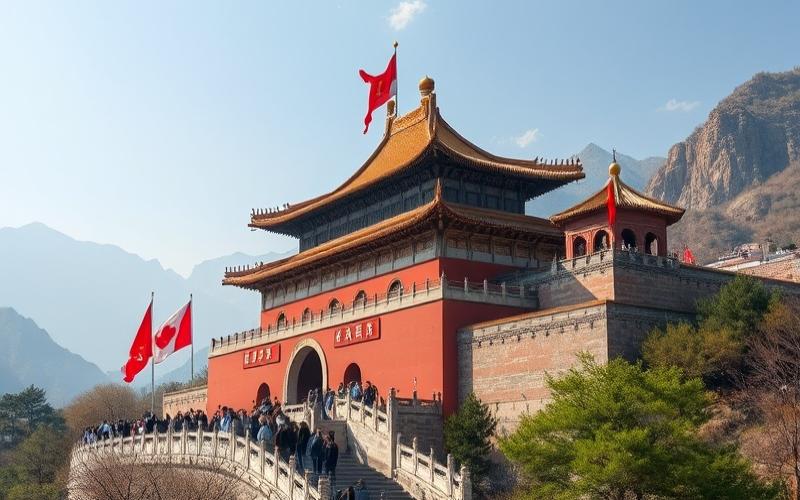
 Published on and written by Cyril Jarnias
Published on and written by Cyril Jarnias
Facing growing pressure to combat environmental degradation, China has intensified efforts to regulate and manage its natural resources more sustainably.
This article examines the ambitious initiatives and legislative reforms the country has implemented to address urgent environmental challenges. From tackling air pollution to protecting biodiversity, these regulations illustrate a renewed commitment toward greener economic development.
As China’s growing role on the international stage prompts it to fulfill its sustainability promises, its environmental strategies offer a fascinating glimpse into how the country seeks to balance economic growth with environmental preservation.
Environmental Law in China: An Overview
Brief History of Environmental Law Evolution in China
- As early as 1972, China participated in the first United Nations conference on the environment, marking the beginning of its institutional commitment.
- In 1973, the first national conference on environmental protection was held in China.
- 1974: Establishment of the first national agency dedicated to environmental protection.
- 1983: Environmental protection officially became a state affair.
- 1998: Following severe floods, the environmental protection agency gained quasi-ministerial status.
- Since the 2000s, proliferation of laws, massive investments in reforestation, and integration of the “ecological civilization” concept into the Constitution in 2018.
Current Main Legislative Frameworks and Objectives
| Law or Regulation | Main Objectives |
|---|---|
| Environmental Protection Law | Prevent and control pollution, protect public health, encourage sustainable development |
| Air Pollution Prevention and Control Law | Emission reduction, air quality improvement |
| Water Pollution Prevention and Control Law | Protection of water resources, combat industrial pollution |
| Wildlife Protection Law | Biodiversity preservation, combat poaching |
| Biosafety Law | Management of biotechnological risks and health threats |
| Environmental Tax System | Hold polluters accountable through increasing financial charges based on their pollutant discharges |
Involved Government Agencies
- National People’s Congress (NPC): legislative body, adoption and revision of environmental laws.
- Ministry of Ecology and Environment (MEE): main executive body, policy coordination, compliance supervision.
- Local Governments: implementation of laws and regulations at the regional level.
- Specialized Agencies: management of forests, water, biosafety, etc.
Recent Initiatives to Strengthen Environmental Protection
- Introduction of the “ecological civilization” concept into the Constitution (2018), elevating environmental protection to a fundamental value.
- Commitment to carbon neutrality by 2060.
- Adoption of environmental taxes and emission quotas to guide industrial behavior.
- National reforestation programs, investments in renewable energy, increased control over polluting industries.
- Cancellation of subsidies to polluting industries.
Challenges in Law Enforcement and Criticisms
- Uneven enforcement of laws between regions, often subordinate to economic growth objectives.
- Insufficient monitoring and sanctioning capacities, especially at the local level.
- Economic pressures and employment often prioritized over the environment, leading to compromises detrimental to law effectiveness.
- Heavy reliance on coal and heavy industries, making it difficult to achieve climate goals.
- Lack of transparency and public participation, although environmental activism is progressing.
Improvement Perspectives Proposed by Experts
- Strengthening the independence and resources of environmental agencies.
- Better transparency and increased involvement of civil society in monitoring and reporting violations.
- Development of legal mechanisms to allow more class actions and lawsuits against polluters.
- Harmonization of environmental policies with national and local economic strategies.
- Acceleration of the energy transition toward renewables and reduction of coal dependency.
Summary of Main Challenges and Recommendations
| Challenges Faced | Expert Recommendations |
|---|---|
| Uneven enforcement, economic priorities | Strengthen agency independence, balance priorities |
| Insufficient monitoring and sanctions | Increase monitoring resources and effective sanctions |
| Limited public participation | Promote transparency and citizen involvement |
| Dependence on fossil fuels | Massively invest in renewables |
Good to Know:
Environmental law in China has evolved significantly since the 1980s, moving from minimal attention to a structured legislative framework with laws like the Air Pollution Prevention and Control Law of 1987 and the amended Environmental Protection Law in 2014 to address growing challenges. Key responsible agencies, such as the Ministry of Ecology and Environment, play a crucial role in implementing and enforcing these regulations. Recently, China has launched ambitious initiatives, including the ‘Blue Sky’ program to reduce air pollution and committed to achieving carbon neutrality by 2060. However, challenges remain, such as insufficient law enforcement in rural areas and criticisms regarding lack of transparency and citizen involvement. Experts propose improving enforcement mechanisms and greater international cooperation to overcome these obstacles.
Chinese Environmental Policies: Initiatives and Challenges
Main Environmental Initiatives Adopted by China
- Commitment to the Paris Agreement: China has set the goal to achieve carbon neutrality by 2060 and a significant reduction in CO₂ emissions before 2030, in line with its international commitments.
- Development of Renewable Energy:
- World’s leading producer of solar panels, wind turbines, and electric vehicle batteries.
- Massive investments in green infrastructure and clean technologies.
- Accelerated electrification of the transport sector (conversion of freight to liquefied natural gas, gradual decrease in oil consumption).
- Notable decrease in emissions from cement (-28% since 2021), but increase in some industrial sectors like metallurgy (+3.5% in Q1 2025).
- Major National Programs
- Beautiful China 2025: Initiative focused on carbon neutrality, pollution reduction, and sustainable industrial development through technological innovation (AI, IoT, carbon capture).
- Digital Ecological Civilization: Fusion between digitalization and greening to monitor natural resources with a unified intelligent system.
- Biodiversity and Natural Resource Protection
- Deployment of a national integrated ecological monitoring system.
- Smart governance using blockchain technology to ensure tracking of natural resources.
- Continuous expansion of urban green spaces and strengthening of waste sorting/recycling.
| Initiative | Main Objective | Key Instrument | Sectoral Scope |
|---|---|---|---|
| Paris Agreement | Carbon neutrality by 2060 | Climate policies | All sectors |
| Beautiful China 2025 | Pollution reduction & eco-development | Technological innovation | Industry/urban planning |
| Digital Ecological Civilization | Smart ecological monitoring | Blockchain & AI | Natural resources |
Major Challenges Faced by China
- Contradiction between economic growth and environmental preservation
Maintaining rapid industrial growth generates increased energy demand; some sectors remain heavily dependent on coal despite progress in renewables. Environmental policies are sometimes counteracted by local or sectoral economic dynamism. - Persistent pollution problems
Despite overall improvement observed in several environmental indicators:- Persistent air pollution in certain industrial regions
- Occasional increase in emissions related to chemical or metallurgical expansion
- Complex management of urban recycling amid rapid urbanization
Legal Implications on Chinese Environmental Law
Recent Legislative Reforms
- Strengthening of the regulatory framework, including:
- Mandatory environmental assessments for all new industrial projects
- Increased sanctions against environmental violations
- Explicit integration of the polluter-pays principle
Impact on Businesses
- Growing obligation to adopt responsible practices (ESG reporting)
- Conditional access to government subsidies/incentives based on green compliance
- Increased legal risk for non-compliance: higher fines; suspension or revocation of licenses
Impact on Citizens
- Strengthened right to a healthy environment; facilitated access to administrative recourse against polluters
- Increased awareness through public campaigns; financial incentives/rewards for sustainable behaviors
Summary List of Advances
- International commitment (Paris)
- Global leadership in renewables
- Integrated digital systems for ecological monitoring
- Progressive strengthening of green legal framework
Summary List of Challenges
- Industrial growth vs. ecological requirements
- Energy-intensive sectors still dominant locally
- Stubborn urban pollution despite structural efforts
Good to Know:
China has taken significant steps to strengthen its environmental policies, notably through its commitment to the Paris Agreement and its role as a global leader in renewable energy development, particularly solar and wind. Carbon emission reduction programs aim to achieve carbon neutrality by 2060. Strict regulations have been implemented to protect biodiversity and manage the sustainable use of natural resources, including natural reserves and stricter laws against pollution. However, China faces challenges such as reconciling its rapid economic growth with its environmental goals, as well as persistent pollution problems, especially in large cities. The legal implications of these environmental initiatives are manifested in recent legislative reforms that not only impact businesses with increased compliance requirements but also influence citizens’ daily lives.
Environmental Regulations in China and Their Impact on Expatriates
Summary of Main Environmental Regulations in China and Recent Reforms
- China has adopted a 2025-2030 action plan to enhance environmental quality and protect public health, comprising 16 concrete measures: improvement of waste sorting and recycling, reduction of air pollution, expansion of green spaces, and improvement of drinking water quality.
- Long-term objectives: achieve carbon neutrality by 2060, multiply solar capacity by 10 and wind and nuclear by 7, strengthen cross-sectoral integration of environmental policies, and promote public awareness.
- Since 2021, ban on import of certain wastes, tightening of industrial emission standards, and mandatory extra-financial reporting for companies.
- Environmental laws are strict, but their enforcement often depends on the involvement of local governments.
Implications for Expatriates Living and Working in China
Compliance with Environmental Standards:
- Expatriates, like Chinese residents, must comply with waste sorting, participate in pollution reduction initiatives, and follow restrictions during pollution peaks.
- Companies employing expatriates are subject to stricter ESG (Environmental, Social, Governance) audits, impacting daily office practices (waste reduction, soft mobility, etc.).
Traffic Restrictions for Foreign Vehicles:
- Some major cities impose traffic restrictions on vehicles with foreign or non-local license plates, including for expatriates, particularly during pollution alerts or in low-emission zones.
- Obtaining green plates (for electric vehicles) is facilitated, but strict limitations for non-locally registered combustion engine vehicles.
Professional Opportunities in the Green Technology Sector:
- Strong job growth in renewable energy, waste management, sustainable construction, and green finance.
- Many skilled expatriates find opportunities in startups and large corporations specialized in energy transition, environmental certification, or water technologies.
| Area of Impact | Examples of Adaptation or Restriction for Expatriates |
|---|---|
| Waste and Recycling | Obligation to sort waste at home and office |
| Mobility | Restrictions on circulation and purchase of combustion engine vehicles, incentives for electric |
| Daily Life | Awareness programs in expatriate neighborhoods, campaigns against indoor pollution |
| Professional Opportunities | Recruitment of foreign experts in clean technologies and environmental auditing |
Concrete Examples of Programs or Initiatives Influencing Expatriates’ Daily Lives
- Introduction of mandatory selective sorting in international residential areas of Shanghai and Beijing, with regular checks and fines for non-compliance.
- Pollution alerts and restrictive measures: temporary closure of international schools, limitation of outdoor sports activities, and advice on using air purifiers at home.
- Companies rewarding employees (Chinese and expatriates) without cars, with bonuses or benefits (e.g., doubling salary for employees without vehicles in certain industrial groups).
- Ecological integration programs in international schools (workshops on recycling, visits to eco-parks, etc.).
Challenges and Adaptations for Expatriates
- Adaptation to Waste Sorting: need to learn new guidelines (different from home countries), under penalty of sanctions.
- Urban Mobility: difficulties in obtaining plates for personal vehicles, pushing many expatriates to opt for public transport, cycling, or shared electric cars.
- Air Quality: investment in air purification equipment for home and office, adaptation of leisure activities to pollution levels.
- Administrative Complexity: need to keep up with rapidly evolving local regulations, especially for professionals in the industrial or consulting sectors.
Testimonials and Case Studies
“We had to change our mobility habits: impossible to register our French car in Shanghai, we opted for renting a shared electric vehicle.”
— Julien, expatriate in Shanghai
“Selective sorting is much stricter than what we were used to in London. We got a fine during the first months, but it pushed us to be more careful.”
— Sophie, resident in Beijing
“Working in a company specialized in renewable energy here means directly participating in the ecological transition of a continent-sized country. The opportunities are immense, but the regulations evolve very quickly.”
— Michael, engineer in a startup in Shenzhen
Key Points to Remember
- China is tightening its environmental regulations, with a direct impact on expatriates’ daily and professional lives.
- Necessary adaptation in waste management, mobility, and compliance with environmental standards.
- Sectors related to green technologies offer new professional opportunities for skilled expatriates.
- Challenges lie in the rapid evolution of regulations and the need to integrate new ecological behaviors into everyday life.
Considering environmental health is now unavoidable for any expatriate in China, both personally and professionally.
Good to Know:
Environmental regulations in China have intensified with recent reforms aimed at reducing pollution and promoting renewable energy, significantly influencing expatriates. The latter must comply with rigorous ecological standards regarding construction and waste management and may face restrictions on importing foreign vehicles that do not meet current emission standards. However, these measures also open new professional opportunities in the green technology sector for expatriates with specific skills. For example, initiatives such as the “Air Quality Action Day” program have raised public awareness about air quality, leading to behavioral changes in daily activities, like increased use of public transport or carpooling among expatriates. Expatriates must adapt to these regulations by implementing sustainable practices in their daily lives, while navigating a job market transforming toward clean solutions.
The Influence of EU Regulations on Environmental Law in China
The European Union’s environmental regulations are based on ambitious objectives and fundamental structuring pillars. The EU aims for environmental preservation, protection of human health, and rational use of natural resources, with the main horizon being climate neutrality by 2050 and decoupling economic growth from environmental degradation.
Main Objectives and Pillars:
- Drastic reduction of greenhouse gas emissions, with an interim target for 2030.
- Climate neutrality targeted for 2050.
- Protection, restoration, and sustainable management of natural capital (biodiversity, air, water, soils).
- Transition toward a circular economy, decoupling economic growth from intensive resource exploitation.
- Zero pollution ambition for air, water, soils.
- Strict application of the polluter-pays, precaution, and prevention principles.
| Pillar | Example of Instrument or Objective |
|---|---|
| GHG Reduction | Carbon market (ETS), EURO VI standards |
| Circular Economy | Waste directives |
| Biodiversity | Natura 2000 |
| Zero Pollution | Strict industrial emission limits |
This policy relies mainly on a demanding legislative framework (framework directives on water/air/waste), as well as funding through European funds dedicated to the green transition.
The European Union is often considered a global reference in environmental matters due to its high standards. This model has had a significant influence on Chinese law:
List of Influence Mechanisms:
- Adoption in China of standards inspired by or aligned with those of the EU in several strategic industrial sectors (automotive: anti-pollution standards similar to EURO; electronic management/RoHS; REACH regulation adapted for chemical substances).
- Gradual creation in China of a national carbon market modeled in its general principle on the European ETS system.
EU-China Bilateral Agreements Facilitating This Influence:
- Regular EU-China dialogues since 2003 around sustainable development through various joint environmental summits.
- Increased technological cooperation in:
- Renewable energies (notably offshore wind)
- Electric mobility
- Smart grids
Concrete Examples of Legislative Convergence:
| Domain | Aligned Chinese Legislation | European Source |
|---|---|---|
| Chemical Substances | Chinese equivalent law to REACH | REACH Regulation |
| Automotive | “China VI” Standards | EURO VI Standards |
| Carbon Market | Chinese national ETS system | EU Emissions Trading System |
Challenges Faced by China Regarding This European Influence:
- Difficult adaptation to the local socio-economic context: need to balance rapid industrial development with high requirements from the European model.
- Still uneven institutional capacities across Chinese regions to effectively apply these ambitious standards.
Major Opportunities:
- Facilitated access to international markets thanks to increasing regulatory harmonization
- Accelerated modernization via European technology transfer
Perspectives:
The EU-China dynamic could strengthen under international pressure facing global climate issues. One can anticipate:
- An intensification of bilateral strategic dialogue,
- An expansion of partnerships toward emerging low-carbon technologies,
- The possible gradual emergence of a Sino-European standard influencing global rules – but always subject to each party maintaining its own interests and considering its economic specificities.
⧉ This cooperation therefore remains essential to collectively address the global climate challenge while fostering regulatory innovation and technological progress. ⧉
Good to Know:
The European Union’s environmental regulations, based on pillars such as carbon emission reduction, waste management, and promotion of renewable energy, often serve as a model for China, influencing its ecological policies. Bilateral agreements between the EU and China have accelerated the transfer of green technologies and stimulated cooperation in renewable energies, fostering legislation like China’s 2018 Air Pollution Law. This influence is also visible in the adoption of European standards regarding energy efficiency. Although this convergence offers opportunities to modernize Chinese infrastructure and reduce its carbon footprint, it nevertheless poses challenges due to socio-economic differences and distinct national priorities. In the future, EU-China collaboration could intensify in response to increased global pressure to combat climate change, thus consolidating a strategic partnership in this domain.
Disclaimer: The information provided on this website is for informational purposes only and does not constitute financial, legal, or professional advice. We encourage you to consult qualified experts before making any investment, real estate, or expatriation decisions. Although we strive to maintain up-to-date and accurate information, we do not guarantee the completeness, accuracy, or timeliness of the proposed content. As investment and expatriation involve risks, we disclaim any liability for potential losses or damages arising from the use of this site. Your use of this site confirms your acceptance of these terms and your understanding of the associated risks.

